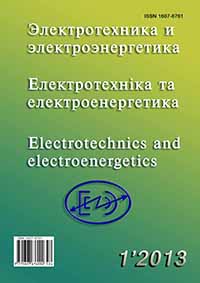THE СONTROL OF THE ELECTRIC POWER CONSUMPTION OF THE INDUSTRIAL ENTERPRISES WITH THE USE OF THE TECHNOLOGICAL RESOURCE
DOI:
https://doi.org/10.15588/1607-6761-2013-1-12Keywords:
schedule of electrical loads, controlling of electric power consumption, control of technological process, energy lossesAbstract
The researches showed that at development of technological processes the questions of energetic efficiency and electric power savings are not enough taken into account; at the same time, industrial consumers always have possibility to optimize their load-graph on this criterion. Therefore the actual is a search of simple and demonstrative methods of power characteristics analysis of technological processes, in particular – to the method of the network planning for electric power integral consumption control in time under the conditions of limited information on a technological process. In order to level the scheme of electric power consumption of industrial enterprises in time it is necessary to expose the limited ways of technological process and analyze the energy capacity and mobility of limiting operations; it allows to find available time reserves due to which it is possible to realize a post-operational time shift.References
ДП «НЕК «Укренерго» [Електронний ресурс] / М-во палива та енергетики України. – К. : Укренерго, 2012. – Режим доступу: http://www.ukrenergo.energy.gov.ua/ – Назва з екрану.
Розен В. П. Використання внутрішніх резервів технологічних процесів при керуванні режимами електроспоживання промислових підприємств / В. П. Розен, М. В. Прокопець // Автоматизація виробничих процесів. – 2006. – № 1 (22). – С. 26–30.
Находов В. Ф. Методологія аналізу та корегування впливу диференційованих тарифів на конфігурацію графіків навантаження енергосистеми України / В. Ф. Находов, Т. В. Яроцька, А. О. Горбоненко // Вісник Вінницького політехнічного університету. – Вінниця: ВНТУ, 2011. – № 6. – С. 72–75.
Серебренніков С. В. Удосконалення критеріїв пріоритетно-кроковогометоду регулювання електроспоживання / С. В. Серебренніков, К. Г. Петрова // Електротехніка та електроенергетика, 2012. – № 1. – С. 65–69.
МихайловВ. В. Тарифыирежимыэлектропотребления / В. В. Михайлов. – М. : Энергоатомиздат, 1986. – 216 с.
Серебренніков С. В. Підвищення економічної ефективності електроспоживання промислових споживачів методами сітьовогопланування та управління в умовах дії диференційованих тарифів / С. В. Серебренніков, К. Г. Петрова // Вісник Східноукраїнського національного університету ім. В. Даля. – Луганськ :СНУ, 2012. – № 11 (182), Ч.2. – С. 208–217.
Серебренніков Б. С. Формування динамічних цін на електроенергію залежно від нерівномірності графіку електроспоживання / Б. С. Серебренніков, К. Г. Петрова // Енергетика та електрифікація. – 2012. –№ 10. – С.18–23.
Енергопостачальна компанія ПАТ «Кіровоградобленерго» [Електронний ресурс] / М-во палива та енергетики України. – Кіровоград : ПАТ «Кіровоградобленерго», 2012. – Режим доступу: http://kiroe. com.ua/ – Назва з екрану
Downloads
How to Cite
Issue
Section
License
Copyright (c) 2017 B. S. Serebrennikov, K. G. Petrova

This work is licensed under a Creative Commons Attribution 4.0 International License.
Creative Commons Licensing Notifications in the Copyright Notices
Authors who publish with this journal agree to the following terms:
Authors retain copyright and grant the journal right of first publication with the work simultaneously licensed under aCreative Commons Attribution License that allows others to share the work with an acknowledgement of the work's authorship and initial publication in this journal.
Authors are able to enter into separate, additional contractual arrangements for the non-exclusive distribution of the journal's published version of the work (e.g., post it to an institutional repository or publish it in a book), with an acknowledgement of its initial publication in this journal.
Authors are permitted and encouraged to post their work online (e.g., in institutional repositories or on their website) prior to and during the submission process, as it can lead to productive exchanges, as well as earlier and greater citation of published work.

